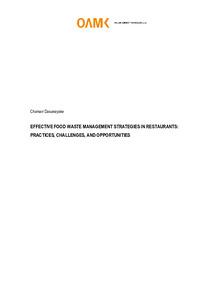Effective food waste management strategies in restaurants: Practices, challenges, and opportunities
Dasanayake, Chamari (2023)
Dasanayake, Chamari
2023
All rights reserved. This publication is copyrighted. You may download, display and print it for Your own personal use. Commercial use is prohibited.
Julkaisun pysyvä osoite on
https://urn.fi/URN:NBN:fi:amk-202305088371
https://urn.fi/URN:NBN:fi:amk-202305088371
Tiivistelmä
This thesis investigates the factors contributing to food waste in three selected restaurants owned by Company X and explores effective strategies for minimizing waste. The study uses a mixed-methods approach, utilizing both quantitative and qualitative research methods to analyse data from November 2022 to January 2023 from the restaurants' management systems, Jamix and BIBook, and to conduct interviews with restaurant managers and representatives of the development department to gain a comprehensive understanding of daily routines, processes, and challenges. A comprehensive literature review was also conducted to lay the theoretical foundation for the research.
The research problem addresses three aspects: the company's data management system, food waste drivers, and waste minimization strategies. The first question, investigated through quantitative data analysis, revealed variations and patterns in food data, particularly moderate-to-high correlations between prepared food and waste amounts. The second question used qualitative data from interviews and literature to identify food waste factors, such as customer estimation difficulties, limited staff resources, inaccurate data entry, typing errors, personal preferences in preparation, cooking waste, and uneven consumption. The third question explored waste reduction strategies through interview data and literature, reporting actions like consolidating buffet stations, using smaller dishes, reusing leftovers, monitoring waste data, selling discounted leftovers, maintaining optimal stock levels, enhancing inventory management, cooking in smaller batches, and collaborating with the R&D team.
The study highlights the importance of regular training and workshops for restaurant staff and adopting new technologies to streamline daily operations. Improved communication among stakeholders and increased awareness of food waste management are crucial for reducing waste. Implementing these strategies and promoting stakeholder collaboration can significantly reduce food waste, fostering a more sustainable future.
In conclusion, this study offers valuable insights into factors contributing to food waste in Company X's restaurants and presents a comprehensive set of waste reduction strategies. Quantitative data analysis and qualitative interviews ensure a thorough understanding of the problem, while the literature review contextualizes findings within the broader academic and industry landscape. By adopting the recommended strategies, restaurants can contribute to the global effort to minimize food waste, promoting a more sustainable and responsible food industry.
The research problem addresses three aspects: the company's data management system, food waste drivers, and waste minimization strategies. The first question, investigated through quantitative data analysis, revealed variations and patterns in food data, particularly moderate-to-high correlations between prepared food and waste amounts. The second question used qualitative data from interviews and literature to identify food waste factors, such as customer estimation difficulties, limited staff resources, inaccurate data entry, typing errors, personal preferences in preparation, cooking waste, and uneven consumption. The third question explored waste reduction strategies through interview data and literature, reporting actions like consolidating buffet stations, using smaller dishes, reusing leftovers, monitoring waste data, selling discounted leftovers, maintaining optimal stock levels, enhancing inventory management, cooking in smaller batches, and collaborating with the R&D team.
The study highlights the importance of regular training and workshops for restaurant staff and adopting new technologies to streamline daily operations. Improved communication among stakeholders and increased awareness of food waste management are crucial for reducing waste. Implementing these strategies and promoting stakeholder collaboration can significantly reduce food waste, fostering a more sustainable future.
In conclusion, this study offers valuable insights into factors contributing to food waste in Company X's restaurants and presents a comprehensive set of waste reduction strategies. Quantitative data analysis and qualitative interviews ensure a thorough understanding of the problem, while the literature review contextualizes findings within the broader academic and industry landscape. By adopting the recommended strategies, restaurants can contribute to the global effort to minimize food waste, promoting a more sustainable and responsible food industry.
